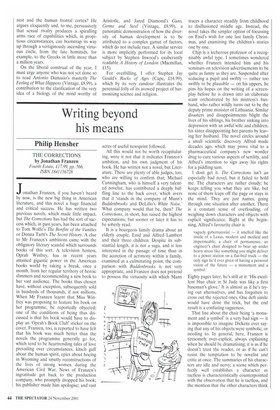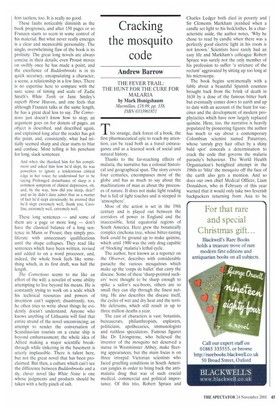Writing beyond his means
Philip Hensher
THE CORRECTIONS by Jonathan Franzen Fourth Estate, £17 99, pp. 566, ISBN 1841156728 Jonathan Franzen, if you haven't heard by now, is the new big thing in American literature, and this novel a huge financial and critical success. He has written two previous novels, which made little impact, but The Corrections has had the sort of success which, in past years, has been attached to Tom Wolfe's The Bonfire of the Vanities or Donna Tartt's The Secret History. A clue to Mr Franzen's ambitions came with the obligatory literary scandal which surrounds books of this sort. A television hostess, Oprah Winfrey, has in recent years attained gigantic power in the American books world by taking a break, once a month, from her regular territory of heroic slimmers and recommending a new book to her vast audience. The books thus chosen have, without exception, subsequently sold in hundreds of thousands, if not millions. When Mr Franzen learnt that Miss Winfrey was proposing to feature his book on her programme, he reportedly objected; one of the conditions of being thus discussed is that his book would have to display an `Oprah's Book Club' sticker on the cover. Franzen, too, is reported to have felt that his book was much better than the novels the programme generally go for, which tend to be heartrending tales of love prevailing over circumstances, kitsch guff about the human spirit, epics about hoeing in Wyoming and smutty reconstructions of the lives of strong women during the American Civil War. News of Franzen's ingratitude got back to the production company, who promptly dropped his book; his publisher made him apologise; and vast
acres of useful newsprint followed.
All this would not be worth recapitulating, were it not that it indicates Franzen's ambition, and his own judgment of his book. He has written not a novel, but Literature. There are plenty of able judges, too, who are willing to confirm that; Michael Cunningham, who is himself a very talented novelist, has contributed a deeply baffling line to the back cover, which avers that it 'stands in the company of Mann's Buddenbrooks and DeLillo's White Noise.' What company would that be, then? The Corrections, in short, has raised the highest expectations; but sooner or later it has to be soberly read.
It is a bourgeois family drama about an elderly couple, Enid and Alfred Lambert and their three children. Despite its substantial length, it is not a saga, and is less interested in the passage of time than in the accretion of acrimony within a family, examined at a culminating point; the comparison with Buddenbrooks is not very appropriate, and Franzen does not pretend to possess the virtuosity with which Mann traces a character steadily from childhood to disillusioned middle age. Instead, the novel takes the simpler option of focussing on Enid's wish for one last family Christmas, and examining the children's stories one by one.
Chip is a lecherous professor of a recognisably awful type. I sometimes wondered whether Franzen intended him and his seminars on television advertisements to be quite as funny as they are. Suspended after seducing a pupil and swiftly — rather too swiftly to be plausible — on his uppers, he pins his hopes on the writing of a screenplay before he is drawn into an elaborate scam orchestrated by his mistress's husband, who rather wildly turns out to be the deputy prime minister of Lithuania. Similar disasters and disappointments blight the lives of his siblings, his brother sinking into depression with an awful wife and children, his sister disappointing her parents by leaving her husband. The novel circles around a small scientific discovery Alfred made decades ago, which may prove vital to a pharmaceutical company's new wonder drug to cure various aspects of senility, and Alfred's intention to sign away his rights for a piddling sum.
I dont get it. The Corrections isn't an especially bad novel, but it failed to hold me. The characters are rather cloudy; he keeps telling you what they are like, but none of them leaps off the page or stays in the mind. They are just names, going through one situation after another. There is a constant sense of overloading, of weighing down characters and objects with explicit significance. Right at the beginning, Alfred's favourite chair is
vaguely gubernatorial — it smelled like the inside of a Lexus, modern and medical and impermeable, a chair of permanence, an engineer's chair designed to bear up under heavy stress like something you might deliver to a power station on a flat-bed truck — the only sign he'd ever given of having a personal vision of the future — a monument and a symbol.
Eighty pages later, he's still at it: 'His excellent blue chair in St Jude was like a first baseman's glove.' It is almost as if he's trying out alternatives, and has forgotten to cross out the rejected ones. One deft simile would have done the trick, but the end result is a confusing vagueness.
That line about the chair being 'a monument and a symbol' is a very bad sign — it is impossible to imagine Dickens ever saying that any of his objects were symbolic, or needing to. In general, here, Franzen is tiresomely over-explicit, always explaining when he should be dramatising; it is as if he doesn't trust the reader, or as if he can't resist the temptation to be novelist and critic at once. The summaries of his characters are idle and nervy; a scene which perfectly well establishes a character as tactless is characteristically counterpointed with the observation that he is tactless, and the mention that the other characters think him tactless, too. It is really no good.
These faults noticeably diminish as the book progresses, and after 150 pages or so Franzen starts to seem in some control of his material. But what never really emerges is a clear and memorable personality. The single, overwhelming flaw of the book is its prolixity. The great long novels are always concise in their details; even Proust moves on swiftly once he has made a point, and the excellence of Buddenbrooks is in its quick accuracy, encapsulating a character, a scene, a relationship in a few lines. There is no expertise here to compare with the sure sense of timing and scale of Zadie Smith's White Teeth or Jane Smiley's superb Horse Heaven, and one feels that although Franzen talks at the same length, he has a great deal less to say. The Corrections just doesn't know how to stop; an argument goes on for dozens of pages, an object is described, and described again, and explained long after the reader has got the point, and, consistently, what had initially seemed sharp and clear starts to blur and confuse, Most telling is his penchant for long, slack sentences:
And when she thanked him for his compliment and asked him how he'd slept, he was powerless to ignore a tendentious critical edge in her voice; he understood her to be saying Prolonged disturbance of sleep is a common symptom of clinical depression, oh, and, by the way, how did you sleep, dear? and so he didn't dare admit that as a matter of fact he'd slept atrociously; he averred that he'd slept extremely well, thank you, Caroline, extremely well, extremely well.
These long sentences — and some of them are a page or more long — don't have the classical balance of a long sentence in Mann or Proust; they simply proliferate with unnecessary qualifications until the shape collapses. They read like sentences which have been written, revised and added to on a word processor, and, indeed, the whole book feels like something which, in its first draft, was half the length.
The Corrections seems to me like an effort of the will; a novelist of some ability attempting to live beyond his means. He is constantly trying to work on a scale which his technical resources and powers of invention can't support; disastrously, too, he often tries to write about things he evidently doesn't understand. Anyone who knows anything of Lithuania will find that entire strand of the novel unconvincing; an attempt to render the conversation of Scandinavian tourists on a cruise ship is beyond embarrassment; the whole idea of Alfred making a major scientific breakthrough while tinkering in the basement is utterly implausible. There is talent here, but not the great novel that has been proclaimed. But then, a culture which can't see the difference between Buddenbrooks and a sly, clever novel like White Noise is one whose judgments and products should be taken with a hefty pinch of salt.



















































































 Previous page
Previous page